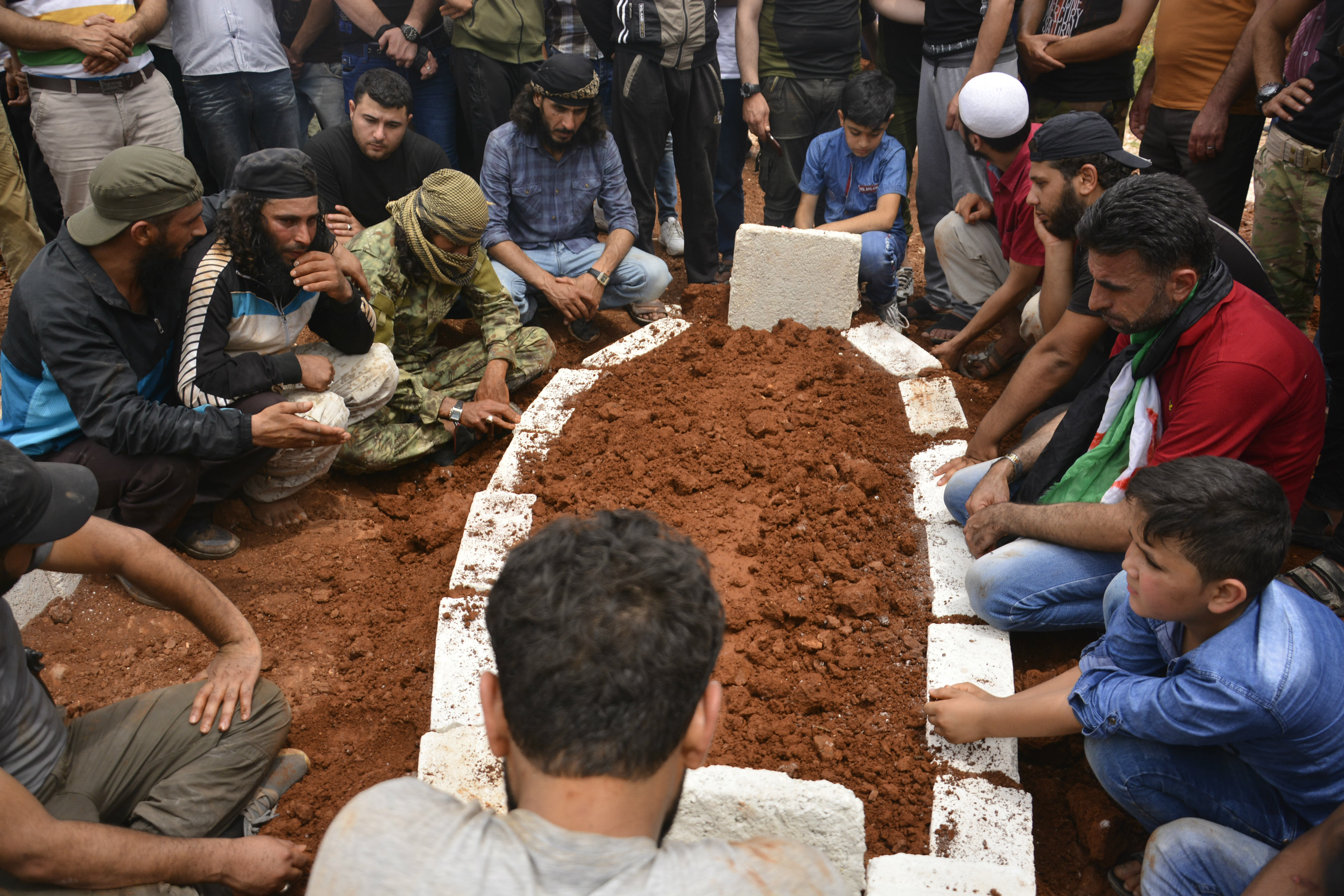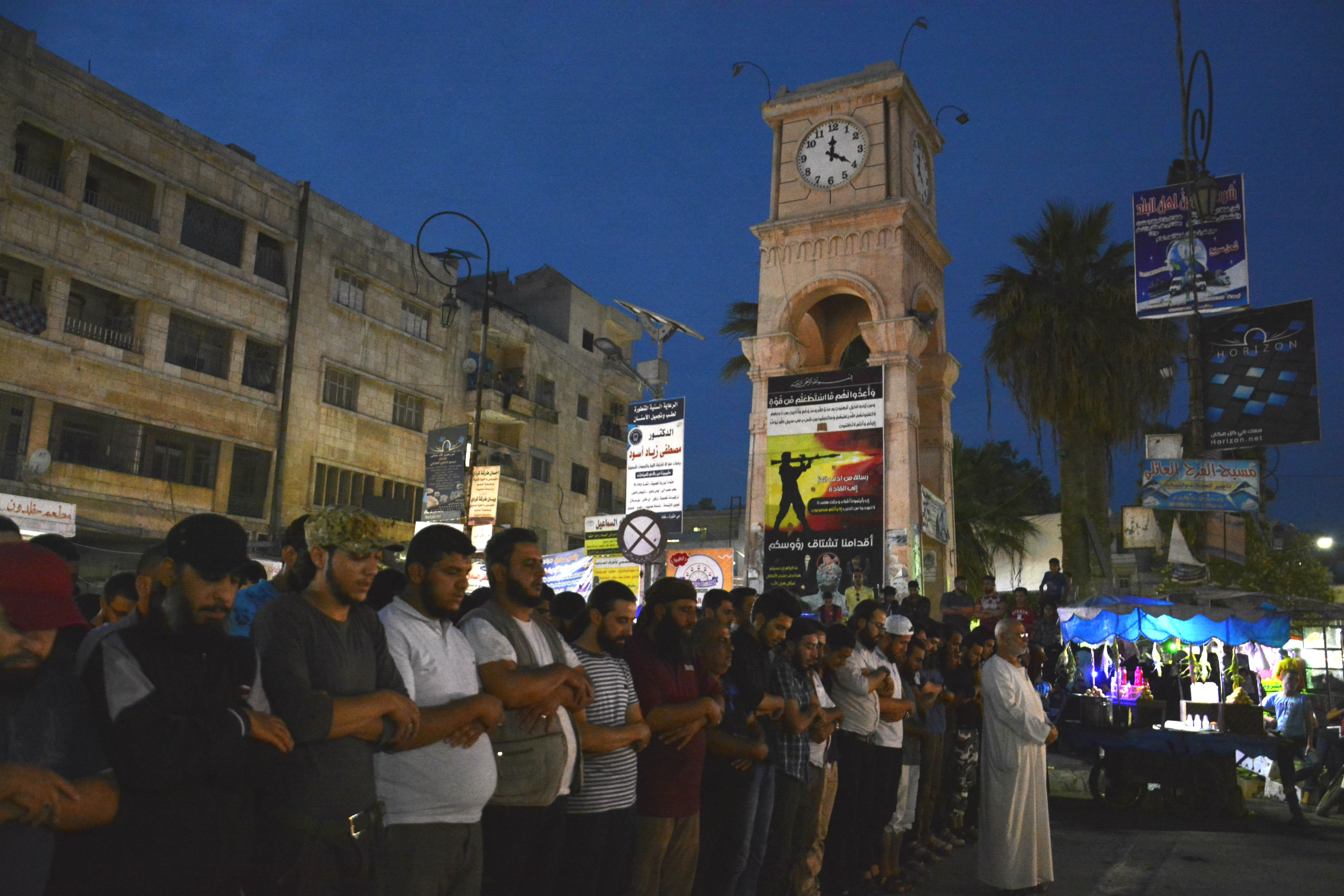Syrians mourn Abd al-Basset al-Sarout, 'the revolution's nightingale'

Hundreds of Syrians flocked to a mosque and cemetery in the Idlib province town of al-Dana on Sunday, bidding farewell to a prominent symbol of their country’s troubled revolution.
Abd al-Basset al-Sarout was a footballer and singer, a protester-turned-rebel fighter displaced from his hometown of Homs. Now he was dead.
The 27-year-old was killed after suffering fatal wounds as rebel fighters staged a counteroffensive against the Syrian government’s weeks-long onslaught in Hama province’s north.
He had been taken to Turkey for hospital treatment, but following his death Sarout’s body was repatriated to be buried in the land he famously eulogised in song.
In al-Dana, mourners gathered around his grave dug in the red Idlib soil. Some said prayers, others struggled to hold back tears.
Stay informed with MEE's newsletters
Sign up to get the latest alerts, insights and analysis, starting with Turkey Unpacked
Rebels and supporters of the Syrian revolution also held services for him in cities, towns and villages across opposition-held areas of northern Syria, such as Afrin, Azaz, al-Bab, Maraa and Idlib city.
Hadi Abdullah, a prominent Syrian activist and journalist from Homs, accompanied Sarout in many stages of the Syrian revolution. He was the first to go to the Turkish hospital when Sarout died, and received his body in Syria.
'The sky was raining at the time of burial, as if it was crying over Sarout’s parting'
- Hadi Abdullah, activist
"When the news of his death had hardly spread in Turkey, I went to the hospital to bid him farewell and a child came up to me. I did not know him. He wanted to see Sarout for the last time, which made me cry,” Abdullah told Middle East Eye.
"I waited for Sarout’s mother to arrive, she thought her son was injured. When she learned that her son had died she struggled to keep her composure, and soon after she recommended all the Syrian rebels keep steadfast, united and together, as was his way."
Abdullah said a great sadness surrounded Sarout’s funeral.
"The sky was raining at the time of burial, as if it was crying over Sarout’s parting. He is a great loss that we cannot compensate for, as no one fills his absence. Yet we will continue our path and we will never retreat," he added.
Soundtrack of the revolution
In the eight years that Syrians have rebelled against President Bashar al-Assad’s rule, death has never been far from Sarout.
Since peaceful protests sprang up in 2011 and spiralled into a kaleidoscopic civil war, fighting and bombing has claimed four of his brothers and his father.
The majority of the songs that Sarout sang as the unofficial bard of the uprising glorified those killed by the Syrian government – estimated in the hundreds of thousands – and called for them to be immortalised and grieved over.
In his most famous song, “For Your Eyes Homs We Offer Our Spirits”, Sarout sang that armed struggle is the only way to be free of injustice, echoing his own transformation from peaceful protester to armed fighter.
Tributes from rebel factions flooded in over the weekend, after the commander of his own Jaish al-Izza group, Jamil al-Saleh, announced Sarout’s death on Friday.
In the tweet announcing Sarout had been killed, Saleh included a video of the rebel driving a motorbike towards the town of al-Lataminah, a Jaish al-Izza stronghold that sits on the frontline with Syrian government forces.
Sarout became known as “the revolution's nightingale”, and his songs have been a soundtrack for revolutionaries throughout the war.
To many Syrians, Sarout’s lyrics "I returned to you as a martyr on the day of Eid" were synonymous with the uprising’s early days.
In fact, this year’s Eid al-Fitr were some of the fighter’s last days.
Engraved in memory
In Binnish, a city in Idlib’s east, activist Aziz al-Asmar responded to the news of Sarout’s death by painting a large mural honouring the slain rebel.
"Today is one of the most difficult and sad days of the revolution. Sarout is now engraved in the memory of all Syrians and he is immortal to us. My humble painting is a tribute from the city of Binnish to the symbol of our revolution," Asmar told Middle East Eye.
"Over eight years we have lost a lot of leaders and prominent people. They lost their lives to the revolution of freedom, we mourn their parting but their heroism is a beacon that assures everyone that our cause needs the greatest sacrifices, and the revolution continues to give birth every day to leaders and heroes."
Unlike many Syrians who found themselves front and centre of the uprising, Sarout kept largely offline.
At a rally in Idlib city in early 2017 that MEE attended, Sarout told the crowd: “I do not have any accounts on social media. I do not need them because I am always with you in the squares and in the battles and in most difficulties.”
A promising young goalkeeper
Before the war Sarout was known in Homs as the promising young goalkeeper for the city’s Karama football team. He had been involved in the national team’s youth sides, and looked set for a successful career before hostilities broke out.
On Sunday, players belonging to Idlib’s Umayya football team gathered in their kits beneath the provincial capital’s clock tower to perform funeral prayers.
The team’s captain, Abu al-Zein al-Homsi, says he defected to his new club as war enveloped the country much like other Syrians broke from the government forces’ ranks to join the rebels.
'Sarout lived free and died free, and those players who returned to the Syrian regime must return to their senses'
- Abu al-Zein al-Homsi, footballer
Using a false name to protect relatives still living under Damascus’ control, he told MEE: “Sarout preferred to join the ranks of the revolution instead of remaining in the Syrian team.
“He played in goal for the Syrian team, then he became the goalkeeper of the revolution.”
Although many football players, such as Omar al-Soumeh and Firas al-Khatib, have controversially returned to Assad-held territory and even played for Syria under the government’s flag, Sarout and Abu al-Zein refused to do so.
The Damascus-based Syrian national team has issued no statement on Sarout’s killing.
“Sarout lived free and died free, and those players who returned to the Syrian regime must return to their senses,” Abu al-Zein said.
“What is right will be revealed in the future and it is impossible for injustice to continue.”
Middle East Eye delivers independent and unrivalled coverage and analysis of the Middle East, North Africa and beyond. To learn more about republishing this content and the associated fees, please fill out this form. More about MEE can be found here.







